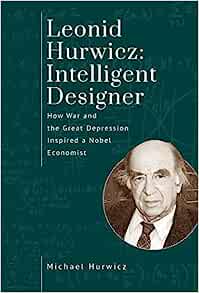Leonid Hurwicz: Intelligent Designer is a very enjoyable biography of one of the winners of the economics Nobel for his work on mechanism design (along with Eric Maskin and Roger Myerson). It’s written by his son Michael Hurwicz, and is therefore a genuine labour of love. It’s clear a lot of work has gone into assembling and recounting this tale of an extraordinary life, from his birth to Polish Jewish refugee parents in revolutionary Russia in 1917, via a childhood in Warsaw after the first World War, through being a near-penniless refugee away from his family during the second World War, to his academic career in the US, mostly at the University of Minnesota. His parents and brother survived the war (albeit his father ending up in a Soviet gulag for some time) and also moved to the US.
The book has very little of the economics, and is interesting as biographies generally are for tracing the intellectual history of their subject. Hurwicz’s family put much emphasis on their sons’ education – as the author writes, “Over the centuries, education had functioned as a uniquely portable form of wealth,” for people whose ancestors had often been forced to move. Hurwicz had been taught by or worked for people ranging from Hayek to Samuelson, Oskar Lange to (at the Cowles Commission) Jacob Marschak. He also sounds a delightful person. One of his characteristics – a love of learning many languages – reminded me of my beloved late tutor Peter Sinclair.
I read the book in two sittings. One reflection it prompted was on the unanticipated consequences of total war: their shaping of the character and ideas of a generation of great postwar economists – as the book’s second subtitle puts it, “How War and the Great Depression Inspired a Nobel Economist”; and on the huge stock of human wisdom the US gained by opening its borders, albeit with reluctance, to European refugees.

